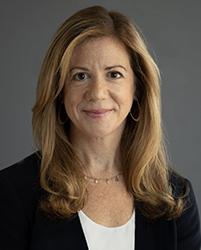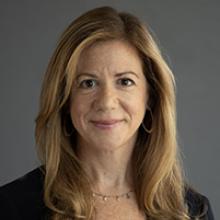Meet AIR's New President, Jessica Heppen
Veteran AIR Researcher Discusses the Challenges and Opportunities Ahead
Jessica Heppen joined AIR in 2004 as a social scientist and program evaluator and is a nationally recognized expert in education research, policy, and practice. Over the past 18 years, she has served in several key organizational roles and led large projects and topic areas for AIR. This month, she became AIR’s seventh president. In early 2024, she will become AIR president and CEO—the first woman to lead AIR in its 76-year history. In this Q&A, Jessica talks about the changes she has seen over the years at AIR, the challenges and opportunities ahead, and what she does in her free time.
Q. You have been at AIR for almost 20 years. What are the biggest changes you’ve seen in the institution during that time?
Jessica: When I started, AIR was rapidly growing. No Child Left Behind was the new federal education law and infused a lot of funding into the development and administration of student assessments and into education research—areas where AIR had deep expertise. Since then, our core identity, mission, and commitment to high-quality research and technical assistance have remained consistent, but a lot has changed. In 2004, there was little to no health work at AIR, and now it is a significant part of our portfolio. Our international development work was quite different 20 years ago, still exciting but less focused on generating evidence. Today, it is much more robust and aligned with our mission. And when I started, there wasn’t meaningful discussion about diversity, equity, and inclusion. Today, it’s a foundational part of AIR.
There have been a lot of changes in just the past few years—AIR’s sale of the Assessment division in 2019; the acquisitions of IMPAQ and Kimetrica in 2020; and the establishment of the AIR Equity Initiative in 2021. Additionally, the COVID-19 pandemic and a national reckoning on racial and social justice have been significant catalysts in AIR’s continued evolution.
Q. What are the biggest changes in the behavioral and social science field that you’ve observed?

Jessica: I have seen growing capacity to generate and apply rigorous evidence using high-quality data, strong research designs, and sound technical assistance methods. The federal government has made significant investments to build this capacity and ensure the field can meet the demand for information about evidence-based approaches to improving systems and practices, and how to best implement them.
With digitization and technological advancements, our field has become increasingly interested in using “big data,” artificial intelligence (AI), and machine learning methods to generate answers to questions that previously required large, lengthy, and expensive data collections. The promise and possibility of answering novel questions using AI is most vividly seen by ChatGPT, the most advanced chat bot yet. AI raises so many questions about when, how, and on which types of technical and social problems actual human brains will be needed in the future.
I believe that human intervention will continue to be needed in AI and automation to mitigate bias. Continued progress toward equity and social justice requires that we not rely on patterns and data of the past but continue to work with intention toward a better future.
Q. AIR’s mission is to generate and use rigorous evidence that contributes to a better, more equitable world. What does the mission mean to you?
I believe in the power of behavioral and social science to reveal root causes of disparities and injustice, and to search for and identify solutions to foster greater equity in systems and society.
Jessica: AIR’s focus on mission is what drew me here to begin with. I believe in the power of behavioral and social science to reveal root causes of disparities and injustice, and to search for and identify solutions to foster greater equity in systems and society. I also believe in the power of data and evidence for driving sound decisions that affect communities and individuals, particularly the most vulnerable. Our mission drives us to generate and apply evidence to support decision making at all levels—global, federal, state, and local—and guides us to work with partners to generate new insights that can help improve the experiences, opportunities, and outcomes for the many who face barriers due to systemic inequality.
In AIR’s mission statement, “generate” and “use” are in linear order, but we know it doesn’t work this way in the real world. Sometimes, we need to provide capacity building or implementation support to organizations, systems, practitioners, and policymakers based on limited evidence. In many cases, our technical assistance work generates new insights on which to base next steps or further studies. We must recognize that bridging research and practice means seeing these as feedback loops and acknowledging that what we learn from practice is of great value for generating new or improved evidence.
Q. What are the biggest challenges facing our nation and the world in coming years? How is AIR poised to help?
Jessica: This is a challenging time in so many ways. The political climate in the U.S. and around the world is highly polarized. In the U.S., we see this playing out in our elections at the federal, state, and local levels, and the way people get their information seems to drive “the sides” further apart. It does affect our work. For example, in states where certain terms or phrases are banned in schools, our technical assistance and research teams must figure out how to do their best work and adhere to project goals, even when working on topics that relate to those terms. Around the globe, we see political strife and conflict erupting, even in countries that have been relatively peaceful in the past. It is very difficult and tiring to live and work in an environment that is so divided and heated. But AIR is poised to help communities, decisionmakers, and individuals during a time of enormous polarization by staying true to our mission and by leading with evidence, not politics.
The economy will be another challenge in the coming years. Right now, inflation and price increases are affecting us all and the chances of a prolonged economic slowdown or recession are very real. That makes it even more important for AIR to contribute to improvements in education, training, and workforce development to increase the likelihood of successful employment. Intergenerational poverty persists—and is growing—around the world and is tied to issues such as malnutrition, addiction, violence, and other social determinants of health. AIR is ready to help improve the systems that create conditions that lead to better outcomes for communities and individuals. It’s imperative that we do so.
Continued progress toward equity and social justice requires that we not rely on patterns and data of the past but continue to work with intention toward a better future.
Climate change will create increasing challenges, too. As a global community, we must address the causes of climate change. But we also must help our communities and regions that are particularly vulnerable to the effects of climate change. AIR can and should focus some of our deep and diverse expertise on addressing ways to mitigate the social, economic, and health effects of climate change and environmental disasters, such a drought and famine, access to viable housing and health services, and more. We have begun this work, but I believe we can and must do more, domestically and internationally.
And, the ongoing effect of the COVID-19 pandemic on education, the economy, and our communities will be a challenge for years to come. It’s easy to get pessimistic, but I believe AIR and its committed, highly experienced staff, can be part of the solution to these and other challenges.
Q. What’s the best book you’ve read recently?
Jessica: It’s hard to pick just one. I love novels that are multilayered, told from various perspectives, with intersecting themes over space and time. I really liked The Vanishing Half, by Brit Bennett; The Henna Artist, by Alka Joshi; and The Candy House, by Jennifer Egan. I recently re-read Weapons of Math Destruction, by Cathy O’Neill, as I consider issues related to algorithmic bias in big data analysis and AI.
Q. What are your favorite podcasts?
Jessica: I think it’s hard to make a good podcast but, done well, I really love the format. It’s a great medium for going deeper into a topic through storytelling and clearly presented analysis. I’m a regular listener of The Daily and some of the other New York Times podcasts, including The Argument, and also WNYC’s Radiolab. Other favorites are Dolly Parton’s America and Nice White Parents.
Q. What’s a typical Saturday for you?

Jessica: I love Saturdays. My kids are big (one is in college) so it’s quiet on weekend mornings. I like to drink coffee and read the paper, get in a longer workout or yoga practice, and then spend time with my family. In the afternoons, I take my dogs (both 2-year-old hound mixes) for a walk while listening to a podcast and watch them run and play. Unless there’s a swim meet or some other kid activity, I like to read on my porch (in all seasons) while my husband plays guitar. In the evening, we often get together with neighbors or venture out into D.C. to try new restaurants or go to shows. We love live music, so you can often find us at the Anthem, the 9:30 Club, or Wolf Trap.
